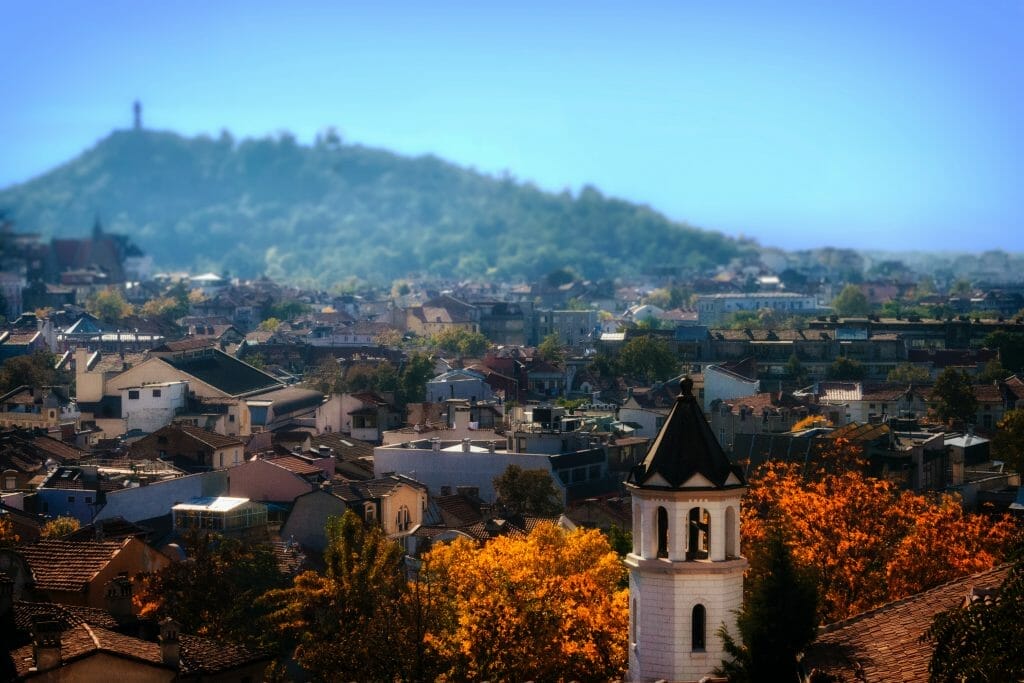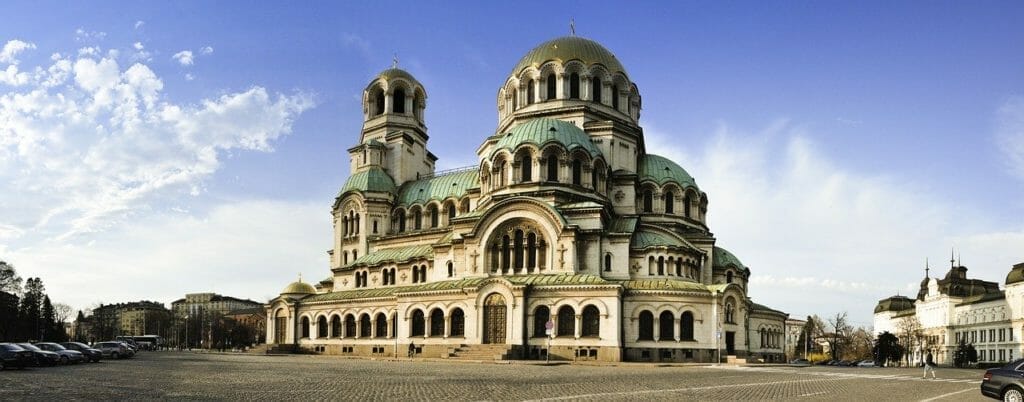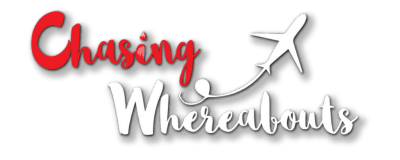Language Spoken in Bulgaria : Spoken Languages of Bulgaria
Planning your trip to Eastern Europe and wondering about what languages are spoken in Bulgaria?
In this post, I will talk in detail about all the spoken languages of Bulgaria and will also talk about you can survive with English in Bulgaria
Bulgaria, an Eastern European country, is home to a diverse linguistic landscape with various languages being spoken within its borders.
From the official language to minority languages and commonly spoken foreign languages, the linguistic diversity of Bulgaria reflects its rich cultural history and geographical proximity to other language communities.
Let us find out more!

What are the Official and Spoken Minority Languages in Bulgaria?
Official Language of Bulgaria
The official language of Bulgaria is Bulgarian. As the native tongue of the majority of the population, Bulgarian holds significant importance in the country’s administrative, educational, and cultural domains.
Minority Languages in Bulgaria
Aside from Bulgarian, Bulgaria is home to a number of minority languages. Turkish, Romani, and other Slavic languages are among the commonly spoken minority languages in the country, reflecting the diverse ethnic and linguistic makeup of the Bulgarian population.
Commonly Spoken Foreign Languages
In addition to the native and minority languages spoken in Bulgaria, various foreign languages are also spoken within the country. English, Russian, Turkish, Spanish, Italian, and German are among the widely spoken foreign languages, reflecting Bulgaria’s connections to global trade, tourism, and diplomatic relations.
Is Bulgarian the Only Language Spoken in Bulgaria?
Other Spoken Languages within Bulgaria
While Bulgarian is the predominant language spoken in Bulgaria, there are other languages in use within the country. Turkish, due to historical and cultural influences, is spoken by a significant portion of the population, particularly in regions bordering Turkey.
Diversity of Languages in Different Regions
The linguistic diversity is further emphasized by the variation of languages spoken in different regions of Bulgaria. The impact of neighboring countries and historical influences has led to regional differences in language usage, enriching the overall linguistic tapestry of the country.
Impact of Multilingualism on Society
Multilingualism in Bulgaria has a profound impact on society, fostering cultural exchange and understanding among different language communities. It also presents unique challenges and opportunities in education, media, and public administration, where accommodating various languages is essential to inclusive communication.
How Many People Speak Bulgarian in Bulgaria?
Number of Native Bulgarian Speakers
Bulgarian is the first language for the majority of the Bulgarian population, with millions of people speaking it as their native tongue. The widespread usage of Bulgarian is a testament to its cultural significance and historical development within the country.
Percentage of Population Fluent in Bulgarian
The majority of the population in Bulgaria is fluent in Bulgarian, with the language being a cornerstone of communication, education, and cultural expression. The proficiency and fluency in Bulgarian extend to various aspects of public and private life, contributing to the cohesive national identity.
Use of Cyrillic Alphabet in Bulgarian Language
The Bulgarian language is distinctive for its use of the Cyrillic alphabet, which adds to its unique character and differentiates it from other Slavic languages. The Cyrillic script is an integral part of Bulgarian linguistic tradition and historical heritage.

Bulgarian Alphabet
The Bulgarian language employs the Cyrillic script, similar to several other Eastern European languages. The Cyrillic alphabet as it exists today was developed in the 19th century.
Comprising a total of 30 letters, the alphabet consists of 6 vowels and 24 consonants.
If you are accustomed to the Latin script used in English and many other languages, you may initially find the Cyrillic script challenging to comprehend. However, with sufficient time and practice, it becomes significantly easier to understand and utilize.
Below is a compilation of the Bulgarian alphabet along with their corresponding sounds in English:
- А а – pronounced as “a” in “bar”
- Б б – pronounced as “b” in “bet”
- В в – pronounced as “v” in “vowel”
- Г г – pronounced as “g” in “glow”
- Д д – pronounced as “d” in “day”
- Е е – pronounced as “e” in “let”
- Ж ж – pronounced as “s” in “treasure”
- З з – pronounced as “z” in “zoo”
- И и – pronounced as “i” in “in”
- Й й – pronounced as “y” in “yes”
- К к – pronounced as “k” in “kid”
- Л л – pronounced as “l” in “live”
- М м – pronounced as “m” in “male”
- Н н – pronounced as “n” in “not”
- О о – pronounced as “o” in “on”
- П п – pronounced as “p” in “pet”
- Р р – pronounced as “r” in “rush”
- С с – pronounced as “s” in “sum”
- Т т – pronounced as “t” in “toll”
- У у – pronounced as “oo” in “shoot”
- Ф ф – pronounced as “f” in “fall”
- Х х – pronounced as “h” in “help”
- Ц ц – pronounced as “ts” in “bits”
- Ч ч – pronounced as “ch” in “chips”
- Ш ш – pronounced as “sh” in “shop”
- Щ щ – pronounced like “sht” in “fresh tuna” (but it’s like one sound)
- Ъ ъ – pronounced as the “u” in “burglar”
- Ь ь – not pronounced; makes the previous consonant softer
- Ю ю – pronounced as “yu” in “you”
- Я я – pronounced as “ya” in “yard”
What are the Influences on Bulgarian Language?
Historical and Linguistic Influences on Bulgarian
The Bulgarian language has been influenced by various historical and linguistic factors, including the interactions with other Slavic and non-Slavic languages over the centuries. This complex evolution has contributed to the richness and complexity of the Bulgarian language as it is spoken today.
Impact of Other Slavic and Non-Slavic Languages
Other Slavic languages, as well as non-Slavic languages such as Greek, Turkish, and Romani, have left their mark on the development of Bulgarian, leading to a linguistic heritage that is both diverse and interconnected with other language traditions in the region.
Beowulf, Thracians, and Ancient Bulgarian Language
The historical roots of the Bulgarian language can be traced back to ancient civilizations, with influences from Thracians and other early inhabitants of the region. Additionally, the epics such as Beowulf have had an impact on the development of the language, highlighting the multifaceted influences on Bulgarian across different time periods.
Is there a Variation of the Bulgarian Language Spoken in Different Regions?
Regional Dialects in Bulgarian Language
Bulgarian language exhibits regional dialectal variations, reflecting the diversity of language usage across different parts of the country. These dialects, shaped by historical, geographical, and social factors, contribute to the linguistic richness of Bulgaria.
Influence of Neighboring Countries on Bulgarian Dialects
Neighboring countries such as Greece, Turkey, and Romania have had an influence on the development of regional dialects within Bulgaria, creating distinct linguistic expressions in border regions and fostering a sense of regional identity through language.
Comparison of Sofia Dialect with Other Regions
The capital city of Sofia has its own distinct dialect, which differs in certain linguistic aspects from the dialects spoken in other regions of Bulgaria. The comparison of these dialects provides insights into the varied linguistic heritage and development of Bulgarian language across different urban and rural areas.
Is Bulgarian easy to Learn?
The level of difficulty in learning a language often depends on your existing knowledge. If you are already familiar with Russian or another Slavic language, learning Bulgarian may be easier for you.
This is mainly because both languages use the Cyrillic alphabet and share some similarities in pronunciation.
However, if you only know English, you may find Bulgarian more challenging to learn due to its unique alphabet and phonetic system that requires some adaptation.
But keep in mind that learning a new language is like embarking on a journey. It requires patience, practice, and a strong determination.
The reward of getting to know the locals and immersing yourself in the society of a new place makes the effort worthwhile. So, don’t give up on learning Bulgarian just because it may seem difficult at first.
How do you say basic words in Bulgarian?
Here are some basic words in Bulgarian:
- Hello: Здравейте (Zdraveyte)
- Goodbye: Довиждане (Dovizhdane)
- Please: Моля (Molya)
- Thank you: Благодаря (Blagodarya)
- Yes: Да (Da)
- No: Не (Ne)
- Excuse me: Извинете (Izvinete)
- Sorry: Съжалявам (Sazhalyavam)
- What is your name?: Как се казвате? (Kak se kazvate?)
- My name is…: Казвам се… (Kazvam se…)
- How are you?: Как сте? (Kak ste?)
- I’m fine, thank you: Добре съм, благодаря (Dobre sam, blagodarya)
Please note that these transliterations may not capture the exact pronunciation of the Bulgarian words, as Bulgarian uses the Cyrillic alphabet.
Conclusion: what language do they speak in Bulgaria
I believe now you know that Bulgarian is the official language of Bulgaria. As I already shared besides Bulgarian, you’ll also hear some Turkish and Romani while travelling through Bulgaria.
Knowing Bulgarian can bring you numerous rewarding experiences, whether you are interested in visiting the captivating Balkan country of Bulgaria, learning a new language, or simply expanding your knowledge about the world.
Remember that language goes beyond mere words and sounds. It serves as a means to understand and connect with individuals from diverse countries, which is truly a beautiful thing.
If you have an interest in languages from this region, feel free to explore my other posts about the Serbian language and the Greek language as it relates to the Greek people.
Bulgarian Language : FAQs
Q: What are the main languages spoken in Bulgaria?
A: The main languages spoken in Bulgaria are Bulgarian and Turkish. Additionally, there are also communities speaking languages such as Roma, Russian, and English.
Q: Is Russian widely spoken in Bulgaria?
A: Russian used to be widely spoken in Bulgaria during the time when the country was part of the Soviet Union, but its usage has declined over the years.
Q: How widely spoken is English in Bulgaria?
A: English is widely spoken in Bulgaria, especially in big cities, tourist areas, and among the younger population. It is also a common second language taught in schools.
Q: What is the significance of Turkish language in Bulgaria?
A: Turkish language is spoken by a significant minority in Bulgaria, mainly by the Turks and is an important symbol of the country’s cultural diversity.
Q: Are there any other notable languages spoken in Bulgaria?
A: Apart from Bulgarian and Turkish, other notable languages spoken in Bulgaria include Romani, Russian, and English, among others.
Q: How did the English language become widely spoken in Bulgaria?
A: The increased usage of English in Bulgaria can be attributed to globalization, tourism, trade, and the country’s efforts to integrate with the European Union.
Q: Is Bulgarian language similar to any other languages spoken in neighbouring regions?
A: Bulgarian is a South Slavic language and shares some similarities with other Slavic languages spoken in neighboring regions, such as Macedonian and Serbian.
Q: What is the historical influence on the languages spoken in Bulgaria?
A: The languages spoken in Bulgaria have been influenced by the country’s history, including the Ottoman Empire and the dominant influence of the South Slavic languages.
Q: How common is it to find fluent English speakers in Bulgaria?
A: Fluent English speakers can be found in Bulgaria, particularly in urban areas, among the younger generation, and in communities with exposure to English-speaking environments.
Q: Can I expect to use English as a primary language in Bulgaria?
A: While English is widely spoken, particularly in cities and tourist areas, it is not the primary language. However, it is often used in business, tourism, and as a lingua franca in multicultural settings.
